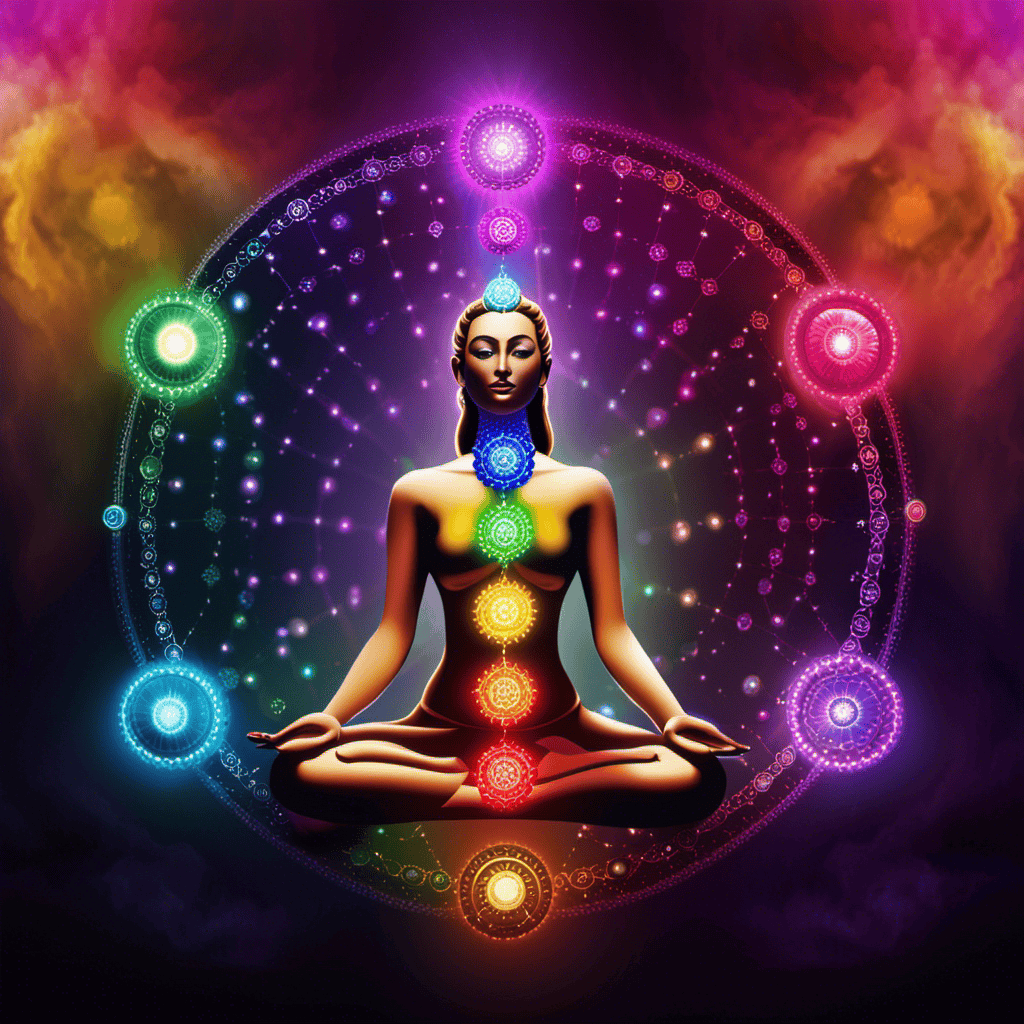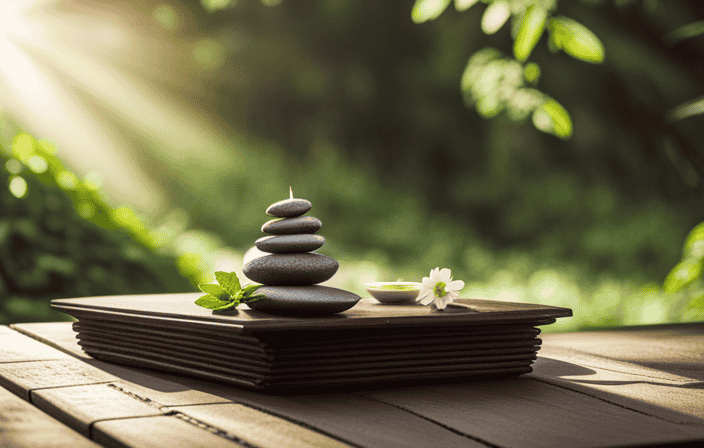It can be easy to become swept up in the whirlwind of daily life in today’s fast-paced world.
But what if I told you there’s a way to find peace amidst the chaos?
Enter mindfulness and meditation, the keys to unlocking a calmer, more centered version of yourself.
These practices, like a soothing balm for the mind, allow you to observe your thoughts without judgment and tap into the present moment.
Join me on this journey as we explore the incredible benefits of mindfulness and meditation.
Key Takeaways
- Mindfulness and meditation can reduce stress and improve self-esteem and self-confidence.
- They are effective treatments for anxiety and depression, and can increase overall well-being.
- Practicing mindfulness and meditation helps individuals observe their thoughts and emotions without judgment, and unlock positive effects by training the mind.
- By embracing the present moment and becoming more mindful, present, and aware in daily life, individuals can experience a change in perspective and reduce emotional reactivity.
What is Mindfulness?
I find mindfulness to be an essential practice in cultivating self-awareness and a non-judgmental attitude towards the present moment.
The advantages of mindfulness are numerous. It reduces stress, improves self-esteem and self-confidence, and increases overall well-being.
By incorporating mindfulness into daily life, one can effectively treat anxiety and depression, as well as take time for oneself and observe thoughts, feelings, and emotions without judgment.
Mindfulness also unlocks positive effects by training the mind to let go of anxiety and negative thoughts, and embrace the present moment.
To incorporate mindfulness into daily life, it is important to focus on a single point of attention, be fully present without judgment or expectation, and change perspective and outlook on life.
This helps to become less emotionally reactive, reduce stress, and increase focus.
Different Types of Meditation
Mantra meditation involves repeating a word or phrase as a focus of attention. This type of meditation is often used to quiet the mind and cultivate a sense of inner peace. By repeating a mantra, we can redirect our thoughts and bring our attention back to the present moment. Mantras can be chosen based on personal preference or intention, and they can be silently repeated or spoken aloud.
Yin Yoga Meditation is another type of meditation that combines meditation with yoga poses. It involves holding passive yoga poses for an extended period of time while maintaining a relaxed state of mind. This practice helps release tension and promotes deep relaxation. By incorporating mindfulness and meditation into yoga, we can deepen our awareness of the body and mind connection.
Overall, these different types of meditation offer unique approaches to mindfulness and can be explored to find what works best for each individual. Whether it’s through mantra repetition or yin yoga, the benefits of mindfulness and meditation can be experienced by anyone willing to dedicate time and effort to their practice.
Tips for Practicing Meditation
To enhance the effectiveness of meditation, it is important to set an intention for the practice and find a quiet and comfortable place to meditate. Setting an intention helps to focus the mind and directs our energy towards a specific goal or purpose. It could be cultivating inner peace, reducing stress, or increasing self-awareness. Finding a quiet and comfortable place allows us to minimize distractions and create a peaceful environment for our practice.
Creating a meditation routine is also beneficial. Consistency is key when it comes to meditation. By incorporating it into our daily routine, we can experience its full benefits. Start with just a few minutes a day and gradually increase the duration as you become more comfortable.
One popular type of meditation is breathing meditation. It involves focusing on the breath as a point of attention. By bringing conscious awareness to our breath, we can anchor ourselves in the present moment and cultivate a sense of calm and relaxation. Research has shown that breathing meditation can reduce stress, improve focus, and enhance overall well-being.
Incorporating a table in markdown format:
| Benefits of Breathing Meditation |
|---|
| Reduces stress |
| Improves focus |
| Enhances relaxation |
| Cultivates present-moment awareness |
| Promotes overall well-being |
Benefits of Mindfulness and Meditation
Practicing mindfulness and meditation can lead to a reduction in stress, an increase in self-esteem, and an overall improvement in well-being. By incorporating these practices into our daily lives, we can experience increased focus and a greater ability to manage stress.
Mindfulness and meditation allow us to pause and take time for ourselves, observing our thoughts, feelings, and emotions without judgment. This non-judgmental attitude helps us unlock positive effects by training our minds to let go of anxiety and negative thoughts.
As we embrace the present moment, we become more mindful, present, and aware in our daily lives. Through regular practice, we can change our perspective and become less emotionally reactive, reducing stress and increasing our ability to focus on the tasks at hand.
Creating a Meditation Practice
When I first started creating my meditation practice, I found it helpful to set aside a specific time and quiet space for my practice. Setting intentions for each meditation session allowed me to focus my mind and bring a sense of purpose to my practice.
I discovered that finding a quiet space, free from distractions, was essential for deepening my meditation experience. This allowed me to fully immerse myself in the present moment and cultivate a sense of inner stillness. Additionally, creating a dedicated meditation space in my home, filled with calming elements such as candles or cushions, helped to create a peaceful atmosphere that supported my practice.
By prioritizing these elements, I was able to establish a consistent and meaningful meditation routine.
Frequently Asked Questions
Can mindfulness and meditation help with physical health issues?
Mindfulness and meditation can indeed help with physical health issues. They have been found to be effective in chronic pain management and improving immune system function. Incorporating these practices into daily life can have a positive impact on overall well-being.
How long does it take to see the benefits of mindfulness and meditation?
It usually takes consistent practice of mindfulness meditation to start experiencing the benefits. With regular sessions, such as daily practice for a few weeks, one can begin to notice improvements in stress reduction, focus, and overall well-being.
Can mindfulness and meditation be practiced by children?
Yes, mindfulness and meditation can be practiced by children. It benefits them by improving focus, reducing stress, and promoting emotional well-being. Methods to introduce mindfulness and meditation include guided exercises, breathing techniques, and playful activities.
Is it necessary to sit in a specific position while meditating?
Different meditation postures can be used, such as sitting cross-legged or on a meditation cushion. However, it is not necessary to sit in a specific position while meditating. Walking meditation is another beneficial practice that can be done while moving.
Can mindfulness and meditation help with sleep problems?
Mindfulness and meditation can indeed help with sleep problems. By practicing mindfulness, we can calm our anxious minds and find relief from anxiety. Meditation improves focus and concentration, enabling us to relax and fall asleep more easily.
Conclusion
In conclusion, diving into the world of mindfulness and meditation is like stepping into a serene oasis amidst the chaos of everyday life.
It’s a journey that allows us to navigate the depths of our own minds and discover the untapped potential within us.
Like a gentle breeze that soothes the soul, mindfulness and meditation offer us the opportunity to find peace and clarity in a world filled with noise and distractions.
So, let us embark on this transformative path, unlocking the power of our consciousness, and embracing a life of presence, self-awareness, and boundless joy.










